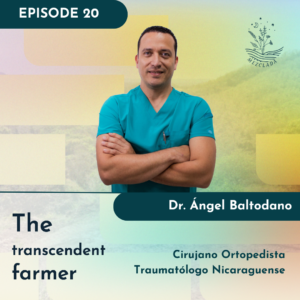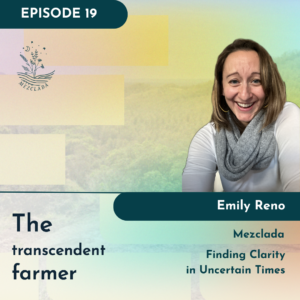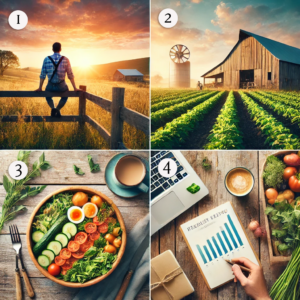There’s a lot of folks that don’t realize the kinds of projects that I’m involved in on a daily basis. Probably because the diversity of projects that I manage can vary so much. On a given day, you may find me recording a podcast episode, designing a website, and facilitating a regional food council meeting.
Today I want to share 5 ways that Mezclada is working to make healthy eating accessible to all, with the aspiration of inspiring you to think creatively about how you can influence the food system, even if it’s not through something direct like raising an acre of corn for yourself and your neighbors. A lot of people get caught up in thinking that to help make our food system more resilient it has to look a certain way. But I’ve found that we all have our own role to play and niche to fill, and the more joy that you can infuse into what that looks like for you, the better.
- Providing evaluation services for the North Central Regional Food Business Center
At the time of this blog post, we’re almost a year and a half into a 5-year project through the USDA. My role is as Lead Evaluator for the North Central Regional Food Business Center. I review surveys from contracted technical assistance providers every 3 months to identify key themes, challenges, and opportunities, summarize what I’m reading, and send that off to my supervisors to combine with information from my colleagues in North Dakota and South Dakota.
What’s meant by ‘technical assistance’? Everything from helping people with developing a business plan to bringing together food systems stakeholders to identify opportunities for collaboration and food system infrastructure investment (ex. Community commercial kitchens, processing facilities, etc.). Most of these services are being provided for free, and is part of a national program, so even if you aren’t located in MN, SD, or ND, Google information about your nearest Regional Food Business Center and you may be able to take advantage of the services in your part of the country.
You can learn more about the North Central Regional Food Business Center aquí.
- Grant Writing
I’ve been writing grants since graduate school. It’s a lot like when I was in college earlier and writing scholarship essays. The focus is just a little bit different and I’ve had to learn a bit more about budgeting. What I enjoy about grant writing is that you’re basically painting a picture in someone’s mind about what you’re building, explaining to someone why it’s a project worth investing in, and explaining how it will positively impact those involved.
This is one of the ways that I’m able to help bring financial resources to community-based projects that would otherwise not continue. For example, in 3 months of grant writing for a client last year, we were able to bring almost half a million dollars worth of grant dollars towards their farm. And all because of the power of WORDS!
It blows my mind to this day. And while I don’t recommend grant writing as a sole source of income for financial sustainability in the long-term, it can be a great way to get a project started or to help offset some initial capital expenses.
A lot of farmers are aware that funding is available to them, but they’re often overwhelmed by the writing process, the short timelines, and the technical jargon. I’m passionate about getting more capital into the hands of family farms and budding sustainable agriculture operations, and even went as far as to create a YouTube series showing people how to leverage artificial intelligence to help with grant writing.
I wanted to make this available as a free resource for anyone who is struggling to access capital to get started with their farm business. You can check out the playlist where I walked through in real time my grant writing process aquí.
- Advocating for more equitable legislation and policies
One of the things I’ve taken away from living in Minnesota for 6 years is the power of being civically engaged. According to the St. Cloud Times, “Minnesota has consistently had the highest voter turnout in the United States. In 2020, Minnesota broke a record when 79.9% of eligible voters in the state voted in the general election. It was the third year in a row Minnesota ranked No. 1 in the U.S. for voter turnout.”
This is definitely reflected in the culture across the state, in the meetings that I participate in as part of work, and conversations I have with fellow farmers. The culture in Minnesota is to know what’s going, to talk with your local legislators, to know who they are in the first place, and to advocate for policies that better serve the citizens.
In comparison to growing up in Kansas, the level of civic engagement and political literacy is a night and day difference. And one of the ways that I do my best to advocate for better legislative policy is through my engagement with things like The Emerging Farmers Working group, of which I served as an inaugural member, and more recently, the MinneAg Network. The Emerging Farmers Working Group works to identify and break down barriers which have historically prevented existing MDA programs from reaching underrepresented communities. You can get a better sense of the group and different grants that the Emerging Farmers Office manages by listening to this episode of the Transcendent Farmer Podcast.
MinneAg is a group of community-rooted farm and food systems organizations that prioritizes agricultural practices that nourish people and the planet. Their mission is to convene leaders on sustainable agriculture and champion nonpartisan policy solutions that protect communities, farmers, and climate, fostering economic resiliency for all Minnesotans.
- Providing strategic direction and facilitation support for the West Central Food Council
One of my favorite projects I’m involved with is the West Central Food Council, which comprises 11 Council members and 5 Advisory Team members interested in improving food policy in Clay, Becker, Otter Tail, and Wilkin Counties. The FPC works to identify policy and program opportunities to expand small-scale farming and improve access to more fresh and nutritious food for all West Central Minnesota residents. The FPC also works to empower residents to live more sustainably. Our guiding document is the West Central Minnesota Regional Food System Plan published in September 2023.
As part of this work, we have 3 Committees – Marketing Local Foods, Food Security, and Urban Agriculture. These committees, led by Council members and members of the public, are working to increase access to healthy food in our four-county region. These groups always welcome new energy and fresh ideas, so if you find yourself living in the region and seeking a meaningful way to contribute to the community, join us!
- Helping reduce the stigma around mental health and well-being for aspiring farmers
One of the things that has made the biggest difference in my life are the investments I’ve made in myself – that is, in my own personal development. Understanding more about how my childhood experiences affect (or used to affect) the way that I see myself today as a grown adult, developing my own definition of what spirituality means to me, having a greater understanding of how my thoughts affect my reality…These aren’t things that we are taught in school, and there’s a lot of misconceptions about what it means to explore these topics as an adult.
I wouldn’t be the person I am today if not for exploring these topics by myself and in the company of others. In fact, most of my friend group today is a reflection of me showing up with my greatest level of authenticity possible.
I strive to share these lessons learned and themes around personal growth and spirituality through online courses, workshops, and coaching. In 2024, I led a short course called Buy a Farm Business, where we talked about the market opportunity that exists in taking over an existing farm business instead of starting completely from scratch and the benefits of that, how to navigate structuring a deal, and the importance of understanding the mindset of your seller. I integrated a lot of elements around mindset into the curriculum, knowing that it’s a big part of setting any kinds of goals for yourself.
I’ll be turning this course into an on-demand learning experience so that no matter where you’re at in your farming career, you can take advantage of the information that was collected and shared with the first cohort of students.
I love connecting with folks to talk about these ideas and explore opportunities for collaboration, so don’t hesitate to reach out via email (hello@mezclada.co).
You’re also encouraged to follow along on the journey by subscribing to the Mezclada newsletter and become a member of the Mezclada family, follow on LinkedIn, Instagram, and Facebook, where I’ll continue to share information that can help you in your farming journey.




